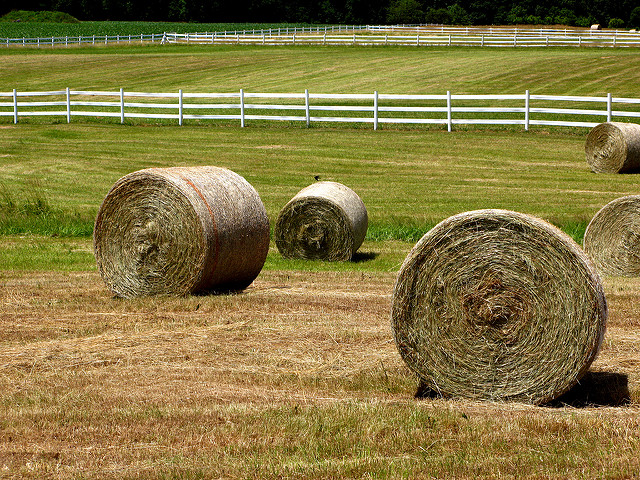Does hay go straight to your horse’s hips? Our friends at Kentucky Performance Products explain why eating less isn’t the answer.
From the KPP Tips & Topics Blog:
Never cut back on hay to reduce calorie intake; instead, change to a more mature grass hay that will provide plenty of fiber but less energy.
Why? Because, hay, which provides your horse with essential fiber, is an extremely important part of a horse’s diet. Horses should consume no less than 1.5% of their body weight per day in fiber. Even overweight horses need fiber to remain healthy.
Calculating the least amount of hay your horse needs:
1,200 lbs = 18 lbs of hay per day (1,200 x .015 = 18)
1,000 lbs = 15 lbs of hay per day (1,000 x .015 = 15)
900 lbs = 13.5 lbs of hay per day (900 x .015 = 13.5)
Not every flake of hay weights the same! Get control of your horse’s calorie count and feed by weight, not by volume.
To determine the weight of a flake of hay by using a digital bathroom scale, follow these five easy steps.
1) Weigh yourself first (120 lbs, e.g.)
2) Weigh yourself holding a flake of hay (123 lbs, e.g.)
3) Subtract your original weight from your weight while holding the hay to determine the weight of the flake of hay. (123-120 = 3, so the flake weighs 3 lbs)
4) Weigh several flakes from several bales of hay to determine the “average” weight per flake.
5) Repeat the process each time you get in a new load of hay.
To provide adequate vitamin and mineral nutrition, skip the handful of grain and instead offer 2 to 4 ounces of Micro-PhaseTM along with your hay. Micro-Phase is designed to provide the nutrients missing from the hay, ensuring your horse gets the nutrition he or she needs without the unnecessary calories.
Article written by KPP staff.
Copyright (C) 2015 Kentucky Performance Products, LLC. All rights reserved.
Article sponsored by Micro-Phase, which provides essential vitamins and trace minerals missing from forages and unfortified diets in an easy-to-digest form.
When health issues arise, always seek the advice of a licensed veterinarian who can help you choose the correct course of action for your horse. Supplements are intended to maintain healthy systems and support recovery and healing. They are not intended to treat or cure illness or injury.

